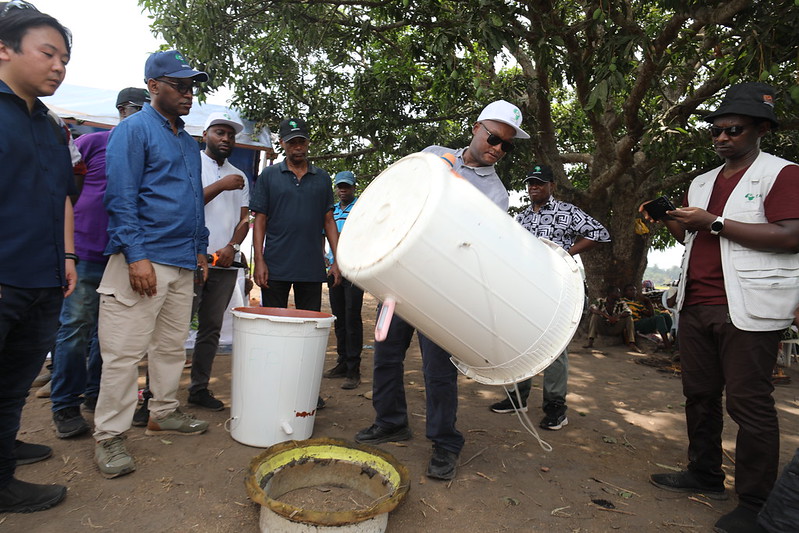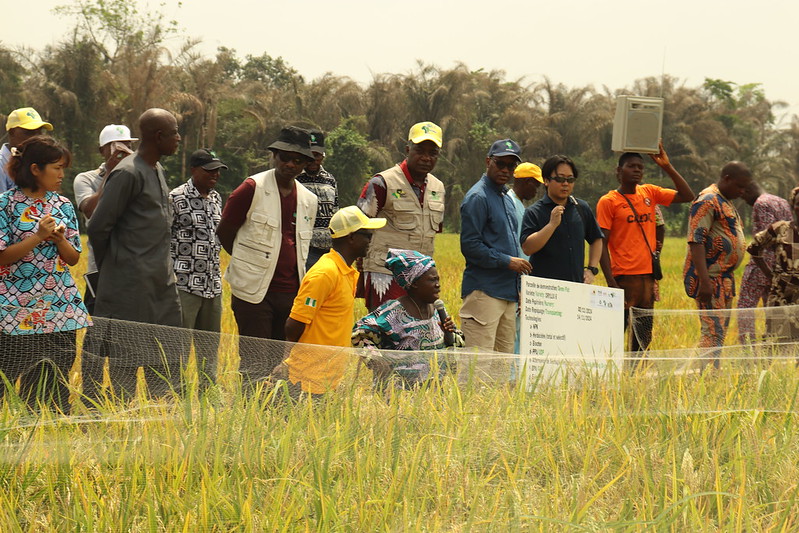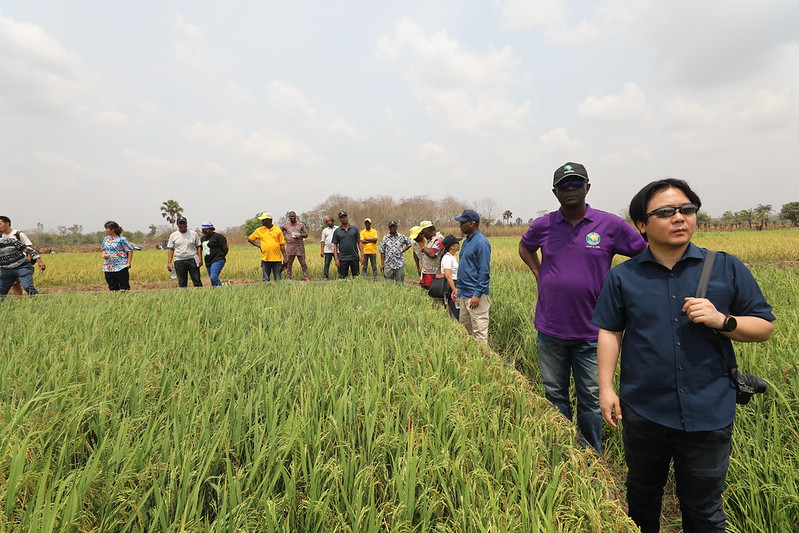
By Atayi Babs
Food and agricultural systems are vital to society’s fabric, nourishing billions and accounting for over 20% of jobs worldwide.
As climate change continues to disrupt growing conditions, farmers’ livelihoods and food security stability will likely face heightened threats.
However, adopting sustainable agricultural practices offers a promising solution to reverse these adverse trends and can significantly enhance global food production.
To advance this objective, the Technologies for African Agricultural Transformation (TAAT) Programme, in collaboration with the African Development Bank, Sasakawa Africa Association (SAA), and the CGIAR Excellence in Agronomy (EiA) hosted rice farmers, extension agents, and stakeholders to a mega field day on February 18th, 2025, at Covè, Benin Republic.
The field day was organised under the framework of the project “Improving rice productivity by decarbonizing cultivation for 12,000 hectares of irrigated paddy fields in the Republic of Benin.” The government of Japan financed the project through the African Development Bank under the Policy and Human Resource Development Grant (PHRDG)
The event comprised interactions with rice farmers on the deployment of regenerative agriculture through selected improved rice seed varieties (Orylux 6 and Faro 67), good agronomic practices, biochar, deep urea application (UDP) and Alternate Wetting and Drying (AWD) irrigation technologies on their farms.
More than 268 rice farmers from 46 cooperatives participated in the Mega Field Day. Representatives of the decentralised structures of the national extension service and local authority administration were also in attendance. Farmers came from cooperatives other than those involved in the project.
The government of Benin was represented by staff of the Ministry of Agriculture, Livestock and Fisheries and the Beninese Institute of Agricultural Research (INRAB)
Mr Takaaki Nomoto, an Executive Director at African Development Bank (AfDB), Ms Rosa Lugos, AfDB’s Principal Resource Mobilisation Officer, Mr Innocent Musabiymana, Chief Agricultural Technologies Officer at the bank, Dr Godwin Atser, Country Director at Sasakawa Africa Association for Nigeria, Dr Solomon Gizaw, Head of the TAAT Clearinghouse and farmer cooperatives participated in the mega field day which ended with the presentation of gifts by appreciative rice farmers to Mr Nomoto.
Farmers at the mega field day observed that the demonstration plots performed better than the control plots as well in the first season.
Madam Léocadie Ganse, a Lead Rice Farmer in Benin, affirmed that the cycle duration of the Orylux 6 variety is short and considered an early variety, which could be used to mitigate the effects of climate change, such as the period of natural flooding. “However, Faro 67 grains are bigger than those of Orylux 6. Consequently, the Faro 67 will weigh more,” she added.

“The aromatic quality of Orylux 6 is more pronounced than that of the variety usually used by farmers (IR 841),” Mr Saturnin Lalou, another Lead Rice Farmer, averred. “Unfortunately, it also attracts more birds and rodents,” he said.
In other words, the Representative of the Ministry of Agriculture, Livestock and Fisheries, Dr Rosanoff Kouke and the President of the Benin Rice Farmers Association, Mr Arouna Bossou appreciated the results obtained by the consortium of partners through TAAT technologies promoted and urged the consortium to extend the project to other regions of the Benin Republic.
Dr Godwin Atser hailed the success of the field. “This is an excellent field day. Nearly all farmers in Benin are represented here, and they have seen the benefits of decarbonisation practices in rice cultivation,” he said.
“The fields are excellent, and the difference is clear between where we intervened and where we did not intervene. The Farmers are very excited about what they have seen and are committed to embracing this climate-resilient way of growing their crops. It’s quite exciting, and we are very proud of what we have done and how the farmers have accepted these new technologies,” Dr Atser added.
According to Dr Solomon Gizaw, “this project has multifaceted benefits for the farmers and the sustainability of agriculture. We are bringing in new varieties, and these varieties yield much higher than the traditional varieties.”
“So, farmers adopting these new varieties record yields from four to seven tonnes per hectare, while those planting the traditional varieties can only get two tonnes per hectare, he said.
Dr Gizaw further averred that “we have successfully introduced farmers to a new method of sustainable soil fertility through regenerative agriculture, which provides solutions not just for this generation but also for saving and keeping the soil healthy for the next generation.”
Mr Takaaki Nomoto expressed confidence that “now that we have evidence of how those technologies can increase production, we will expand this to other regions.”
“After this field day, we will discuss possibilities with the Ministry and the AfDB so we can move forward,” he added.

Regenerative farming
Climate-smart agriculture, sometimes called regenerative or carbon farming, focuses on climate-smart inputs, agro-ecological practices, efficient irrigation technology, and precision farming techniques.
It aims to mitigate and adapt to the effects of climate change, enhance soil health and biodiversity, and improve farmer income while producing additional high-quality food.
Climate-smart agriculture lies at the heart of the global efforts to achieve climate neutrality in the land-use sector by 2035.
Benin Republic, a West African nation, relies heavily on rice as a staple food. Over the years, the country has seen significant developments in rice production, importation, and consumption, influenced by domestic agricultural policies and regional trade dynamics.
However, rice production in flooded regions of the country is compromised by the emission of methane (CH4), an important greenhouse gas (GHG) with a global warming potential 21 times greater than that of the CO2 molecule.
Growing rice in flooded fields produces methane because the standing water blocks oxygen from penetrating the soil, thus creating conditions conducive for methane-producing bacteria. Rice cultivation under flooded conditions is responsible for 10-16% of GHG emissions from agriculture in different countries.
Decarbonising Rice Cultivation
The project “Improving rice productivity by decarbonising cultivation for 12,000 hectares of irrigated paddy fields in the Republic of Benin” aims to enhance Rice productivity through decarbonising cultivation.
This comprises practices that reduce biogenic methane from rice cultivation and promote the culture of resource efficiency by reducing consumption and improving the conservation of irrigation water, chemical fertilisers, and energy for cultivation and harvesting, as well as farm waste processing, reducing waste in the food supply.
The technologies usually promoted under the decarbonised farming practices create the benefits of not only offsetting emissions but also restoring degraded soils, enhancing crop production, reducing pollution by minimizing erosion and nutrient runoff, purifying surface and groundwater, and increasing microbial activity and soil biodiversity.












